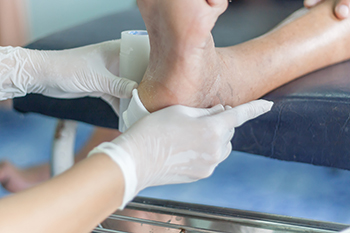
Heel ulcers can start small but often grow into serious wounds that are slow to recover. These open sores usually appear on the back of the heel and may begin with redness, dryness or thickened skin. People with diabetes or poor circulation are especially at risk, as the skin on their feet can break down more easily. Pressure from walking or shoes that do not fit well can make the problem worse. Over time, the skin may crack, drain or develop a scab that never quite closes. Treatment involves relieving pressure, cleaning the area carefully and often using special dressings or prescribed medications. In more advanced cases, a podiatrist may need to remove dead tissue to encourage healing. If you notice a sore on your heel that does not improve, it is suggested you see a podiatrist for diagnosis and appropriate treatment.
Wound care is an important part in dealing with diabetes. If you have diabetes and a foot wound or would like more information about wound care for diabetics, consult with one of our podiatrists from Comprehensive Foot & Ankle Centers. Our doctors will assess your condition and provide you with quality foot and ankle treatment.
What Is Wound Care?
Wound care is the practice of taking proper care of a wound. This can range from the smallest to the largest of wounds. While everyone can benefit from proper wound care, it is much more important for diabetics. Diabetics often suffer from poor blood circulation which causes wounds to heal much slower than they would in a non-diabetic.
What Is the Importance of Wound Care?
While it may not seem apparent with small ulcers on the foot, for diabetics, any size ulcer can become infected. Diabetics often also suffer from neuropathy, or nerve loss. This means they might not even feel when they have an ulcer on their foot. If the wound becomes severely infected, amputation may be necessary. Therefore, it is of the upmost importance to properly care for any and all foot wounds.
How to Care for Wounds
The best way to care for foot wounds is to prevent them. For diabetics, this means daily inspections of the feet for any signs of abnormalities or ulcers. It is also recommended to see a podiatrist several times a year for a foot inspection. If you do have an ulcer, run the wound under water to clear dirt from the wound; then apply antibiotic ointment to the wound and cover with a bandage. Bandages should be changed daily and keeping pressure off the wound is smart. It is advised to see a podiatrist, who can keep an eye on it.
If you have any questions, please feel free to contact our offices located in Shepherdsville and Louisville, KY . We offer the newest diagnostic and treatment technologies for all your foot care needs.
